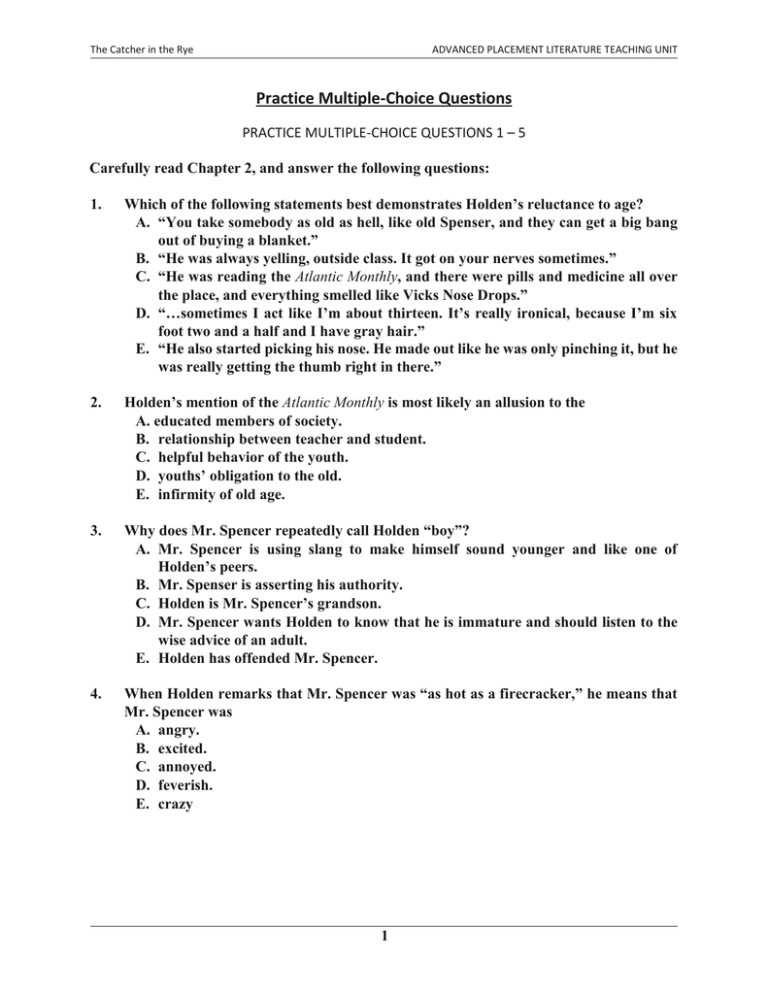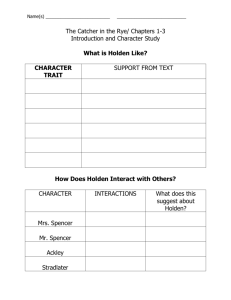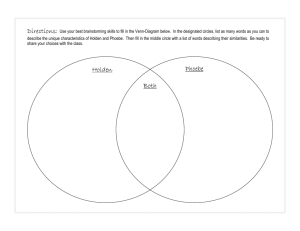Practice Multiple-Choice Questions
advertisement

The Catcher in the Rye ADVANCED PLACEMENT LITERATURE TEACHING UNIT Practice Multiple-Choice Questions PRACTICE MULTIPLE-CHOICE QUESTIONS 1 – 5 Carefully read Chapter 2, and answer the following questions: 1. Which of the following statements best demonstrates Holden’s reluctance to age? A. “You take somebody as old as hell, like old Spenser, and they can get a big bang out of buying a blanket.” B. “He was always yelling, outside class. It got on your nerves sometimes.” C. “He was reading the Atlantic Monthly, and there were pills and medicine all over the place, and everything smelled like Vicks Nose Drops.” D. “…sometimes I act like I’m about thirteen. It’s really ironical, because I’m six foot two and a half and I have gray hair.” E. “He also started picking his nose. He made out like he was only pinching it, but he was really getting the thumb right in there.” 2. Holden’s mention of the Atlantic Monthly is most likely an allusion to the A. educated members of society. B. relationship between teacher and student. C. helpful behavior of the youth. D. youths’ obligation to the old. E. infirmity of old age. 3. Why does Mr. Spencer repeatedly call Holden “boy”? A. Mr. Spencer is using slang to make himself sound younger and like one of Holden’s peers. B. Mr. Spenser is asserting his authority. C. Holden is Mr. Spencer’s grandson. D. Mr. Spencer wants Holden to know that he is immature and should listen to the wise advice of an adult. E. Holden has offended Mr. Spencer. 4. When Holden remarks that Mr. Spencer was “as hot as a firecracker,” he means that Mr. Spencer was A. angry. B. excited. C. annoyed. D. feverish. E. crazy 1 5. Holden writes the note to Mr. Spencer at the bottom of his essay because he A. wants Mr. Spencer to give him a passing grade. B. knows he wrote a great essay, but wants to appear modest. C. wants to make Mr. Spencer laugh. D. wants to make Mr. Spencer feel less guilty about failing him. E. knows the information he wrote about the Egyptians is inaccurate. Answers with Explanations 1. A. In this statement, Holden is ridiculing Mr. Spencer, a representative of all old people, who gets excited over such a stupid thing as an Indian blanket. This observation of the simplemindedness of the elderly makes Holden desire to stay youthful and, in effect, value only the things that are meaningful. B. Not only is this observation about Mr. Spencer’s volume and not his old age, but it is about the man as an individual instead of a symbol of the elderly population. This statement may make Holden reluctant to be like Mr. Spencer, but it does not suggest that he is reluctant to age. C. The description of these items represents Mr. Spencer’s illness, to which old age may have made him more susceptible but did not directly cause. This is not the best answer. D. Holden talks about his gray hair in a neutral, factual tone. The color of his hair does hint at old age and maturity, but it does not make Holden feel any older or make him anxious about aging. E. There is nothing about old age in this statement. 2. A. Even though the Atlantic Monthly is read by Mr. Spencer, who is well educated, this statement is too general and has no bearing on the text. B. The Atlantic Monthly does appear in a scene in which the relationship between Mr. Spencer and Holden is developed, but it does not actively affect their connection. C. Twice, the magazine is mentioned when Mr. Spencer tries to throw something on the bed, misses, and Holden helpfully picks it up. However, the first time the Atlantic Monthly is mentioned, Holden is not doing anything to aid Mr. Spencer. Therefore, this answer is false. D. The last two times the magazine is mentioned, Holden is picking an object off the floor for Mr. Spencer; however, he does not do this out of obligation. Furthermore, this only accounts for two of the three times the Atlantic Monthly is mentioned. E. The Atlantic Monthly is always mentioned in juxtaposition to objects or actions that show Mr. Spencer is old and ill. The first time the Atlantic Monthly is mentioned, Mr. Spencer is reading it and is surrounded by medication and Vicks Nose Drops. The second and third time it is mentioned, Mr. Spencer is trying to toss something on the bed, and because his eyesight and hand-eye coordination is not good, misses. These three instances of juxtaposition show that the Atlantic Monthly is connected with the infirmity of old age. 3. A. This statement is not true. Mr. Spencer’s tactic is to make Holden feel younger and inferior so he will listen to Mr. Spencer’s advice. Mr. Spencer does not want Holden to mistakenly believe that they are equals. B. Mr. Spencer is asserting his authority, but this statement does not answer why Mr. Spencer is addressing Holden in this way. C. Holden is Mr. Spencer’s student, not his grandson. D. Mr. Spencer is calling Holden “boy” to make Holden feel immature. This way, Mr. Spencer will make Holden question his judgment and consider Mr. Spencer’s mature, informed advice instead. E. Holden insults Mr. Spencer in the narrative, but he is very polite and considerate to him in person. 4. A. Mr. Spenser is disappointed that Holden has been expelled from school, but he is not angry. B. Because this comment about Mr. Spencer’s behavior follows Holden’s statement “But you couldn’t stop him,” the reader can interpret Holden’s simile to mean that Mr. Spencer is excited and will not stop talking about the essay. C. While Mr. Spencer is annoyed at Holden’s carelessness in school, the simile “hot as a firecracker” would not be an adequate simile to describe this feeling. D. The simile is a statement describing the way Mr. Spencer is behaving and not describing the physical state of well being. Even so, the text never says that Mr. Spencer has a fever. E. The argument Mr. Spencer makes to Holden is very rational; he is not crazy. 5. A. While it may initially seem to the reader that Holden is writing this note to persuade Mr. Spencer to give him a passing grade, Holden later says that he wrote the note so Mr. Spencer would not feel bad giving him a failing grade. In addition, if Holden is unconcerned about passing the other classes he is failing, he would probably not worry about passing history. B. This statement is incorrect. Holden knows that he wrote a terrible essay. That is the reason he does not want Mr. Spencer to read it back to him. C. There is nothing comic in Holden’s note to Mr. Spencer. D. Holden says, “I’d only written that damn note so that [Mr. Spencer] wouldn’t feel too bad about flunking me.” This appears to be true and in line with Holden’s character. Other parts of the text reinforce the idea that Holden is a warmhearted person who wants to avoid offending and upsetting others. It is very likely that he wrote this note for the reason he states. E. Holden does know that the information in his essay is inaccurate, but this would not motivate him to write the note. Sample Response: Quote Analysis Hints: When analyzing the significance of a quote, be sure to consider all of the relevant elements. Begin with P.A.C.C.T.S (plot, mood/atmosphere, character, conflict, theme, setting). Once you have looked at these key elements, consider how other elements such as diction, figurative language, irony, tone etc. work to develop any of the key elements and thus the significance of the quote. Life is a game, boy. Life is a game that one plays according to the rules.” “Yes, sir. I know it is. I know it.” Game, my ass. Some game. If you get on the side where all the hot-shots are, then it’s a game, all right—I’ll admit that. But if you get on the other side, where there aren’t any hot-shots, then what’s a game about it? Nothing. No game. In Chapter 2, Holden goes to see his history teacher Mr. Spencer before he leaves Pencey Prep after being expelled. In this conversation, Mr. Spencer is lecturing Holden about failing all but one of courses at Pencey and reminding Holden about the importance of “playing by the rules” in order to be successful; not only in school, but in life. This conversation primarily develops Holden’s character. First, is his duplicitous nature. He is polite and agreeable to Mr. Spencer, yet his thoughts reveal his true contempt, not just for Mr. Spencer, but society in general. These cynical remarks also show how alienated Holden feels. He insinuates that he is not one of the “hot-shots” who plays the “game” and “wins”, but is instead on the “other side” of the “game”; where there is “no game”. This reveals that Holden’s alienation from society is partially because of his cynical attitude toward others. However, upon further examination, this cynical attitude seems to stem from the loneliness and alienation he feels as an outsider. His anger, cynicism and refusal to “play according to the rules” is his defense mechanism, or his way of protecting himself from the loneliness, rejection and isolation he feels and such is the complexity of his character. There is also note of irony in his feelings because according to society’s “rules” he should be a “hot-shot” because of his privileged background, yet he is “on the other side. Thus, Holden’s conversation with Mr. Spencer is one of the first psychological revelations of his psychologically complex character. Theme Paragraph - Sample Look- for: Paragraph structure – Topic Sentence (clear argument); Point (supporting argument)Proof (specific example)-Analysis (insight into how this develops theme) (x2-3), Concluding sentence (summary of main idea) Sample Topic: Alienation as Protection T.S- Holden alienates himself from society to protect himself from the phoniness of the world around him. Point- Holden’s cynicism of the “phony” world around him at Pencey Proof – wears his red hat; tells Ackley it is his “people shooting hat” Analysis – This is a way of protecting himself from a society where he doesn’t fit in. He later tells Phoebe that the school was full of phonies but the reality is that he “was on the outside” as he admits. He is not a “hot shot” and knows it, so he protects himself by seemingly intentionally isolating himself. *Repeat Point – Proof – Analysis and Concluding Sentence*


